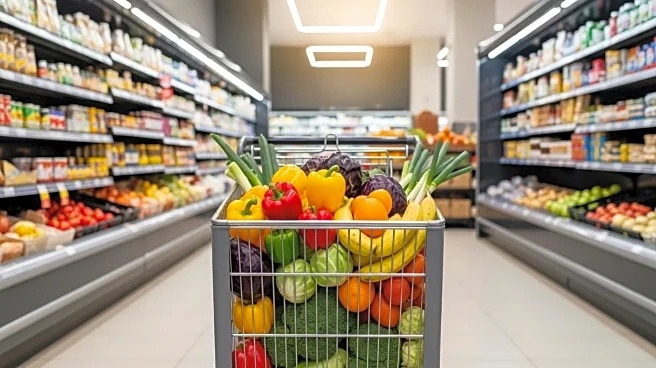What is the story about?
What's Happening?
Amazon.com, Inc. has announced the launch of Amazon Grocery, a new private label brand that merges its existing Amazon Fresh and Happy Belly brands. This new brand will offer over 1,000 food items, all priced under $5, including essentials such as milk, fresh produce, meat, seafood, and pantry staples. The packaging for Amazon Grocery is designed to be modern and easy to read, aiming to enhance the shopping experience by making it easier for customers to identify high-quality, budget-friendly options. The launch also includes new products like fresh bakery cinnamon rolls, refrigerated pizza dough, and bottled water, with plans to expand into frozen meals and other categories. This move follows a 15% increase in private brand product purchases in 2024 across Amazon.com, Whole Foods Market, and Amazon Fresh.
Why It's Important?
The introduction of Amazon Grocery signifies a strategic expansion in Amazon's private label offerings, potentially reshaping the grocery market by providing consumers with more affordable options. This move could intensify competition with other major retailers like Walmart, which also focuses on budget-friendly grocery items. By offering a wide range of products at lower prices, Amazon aims to attract cost-conscious consumers, potentially increasing its market share in the grocery sector. This expansion could also pressure other retailers to adjust their pricing strategies to remain competitive. Additionally, the focus on private label products allows Amazon to have greater control over production and pricing, which could lead to higher profit margins.
What's Next?
Amazon plans to continue expanding its product offerings under the Amazon Grocery brand, with future introductions of frozen pasta meals, pie fillings, and expanded selections of deli meats and canned goods. The company is likely to monitor consumer response closely to adjust its product lineup and pricing strategies. As Amazon continues to grow its private label portfolio, other retailers may respond by enhancing their own private label offerings or by focusing on differentiating their products through quality or unique features. The ongoing competition in the grocery sector could lead to more innovation and better deals for consumers.















